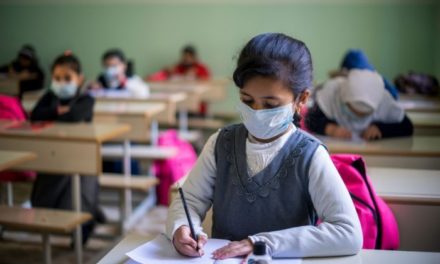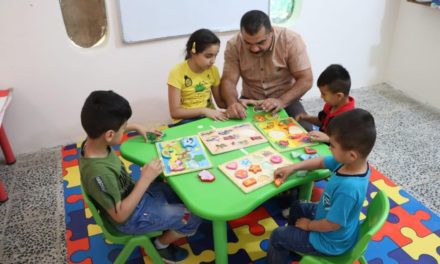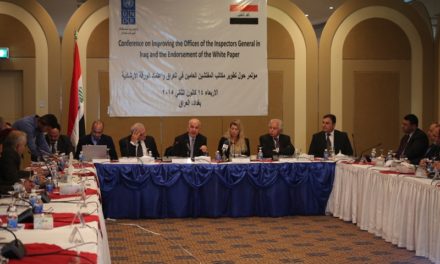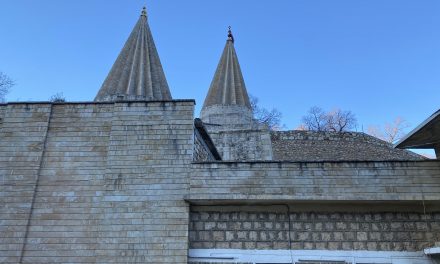Since operations began in and around Mosul, the military advance in Iraq has been nothing short of a perfect storm. The battle for northern Iraq’s major city knocked over the first domino in what has developed into a humiliating year for the so-called Islamic State (Da’ish). One stronghold after another has been liberated by a resurgent Iraqi military, determined to heal the wounds of the past. The Mosul operation dragged on for months, rapidly turning into one of the bloodiest and most difficult urban warfare battles since World War ll. After the conclusion of that battle, Da’ish morale across the country evaporated. Since then, the Iraqi flag has been raised in Tal ‘Afar, Hawijah and Al-Qa’im in rapid succession.
The collapse of Da’ish forces across Iraq and in eastern Syria is primarily the result of depleted morale and manpower, but another factor is recognizing when the battle is lost. Senior Da’ish militants have been here before and they have learnt their lesson. They know that it is time for them to regroup and rebuild. The damage dealt to the communities Da’ish targeted has been immense and will take years to repair and while their defeat is worthy of celebration, their return to low-level insurgency tactics is an ominous indicator for what is still to come.
As for the unfolding drama in Kirkuk and other disputed areas, it has been a long time coming. There was no feasible option for the Iraqi government other than reasserting control over these lands. As the disastrous events of summer 2014 unfolded, the Kurds seized their opportunity and conducted a series of land-grabs across northern and central Iraq, taking over areas abandoned by Iraqi forces. The primary focus has been and remains Da’ish but the Kurdish transgression had to be rectified with the least amount of bloodshed possible. And that is exactly what has happened.
As many predicted, the Kurdish referendum backfired spectacularly. But no one imagined that within a couple of weeks, not only would Kirkuk be back under federal control but pretty much every other disputed area in Diyala, Salahuddin and Ninawa provinces too. The Kurdish dream was crushed not by Baghdad but by the greed and ambition of the Barzani dynasty sitting comfortably in Erbil. Had it not been for their attempt to exploit the desire of the Kurdish people for independence to buttress the power of Mas’oud Barzani, Kirkuk and its oil could have remained under their control for the foreseeable future.
Iraq now faces a host of challenges from rehousing hundreds of thousands of internally displaced civilians as an unforgiving winter looms to the financial hardships born of corruption, low oil prices and a 3-year military campaign. But the security situation must remain the main focus in order to ward off the eventual revival of the next mutant offspring of Salafi jihadism and the latent affinity of some corners of the Sunni community for absolute power in Iraq.
Western Iraq.
The province of Anbar can only be described as a tinderbox. The Sunni heartland has been seeped in violence since the early days of the occupation and not much has changed. Today, most of the province is back in Iraqi hands after hard-won battles in Fallujah and Ramadi last year while Da’ish still has a speckle of control in Anbar’s western desert. Rawah is the only major town remaining in Da’ish hands after recent victories for Iraq’s armed forces in Rutbah, Anah and Al-Qa’im. The Iraqi-Syrian border region will have to become a focal point of the new military strategy to protect Iraq as the war in Syria continues. However, the recent victory on the Syrian side of the border in Albu Kamal is a very positive step in ensuring the Da’ish threat from Syria will be minimized.
Rawah is now encircled and the operation to liberate this town could begin at any moment, with Iraqi forces waiting for the final order from PM Abadi. Reports from the town suggest Da’ish is ready to surrender Rawah and flee to fight another day. We have seen the same tactic in Tal ‘Afar, Hawijah, Anah, Rutbah and Al-Qa’im so far. The group is currently in disarray and cannot function as a proper fighting force like they did during the battles for Baiji and Tikrit.
Iraq’s legendary Suqour (Falcon) intelligence cell has hunted down and eliminated hundreds of Da’ish commanders and terror cells in western Anbar over the last year or so, greatly diminishing the threat to Baghdad and the south. This effort has also starved Da’ish’s operational viability in Anbar and the north, not allowing them any space to launch any major operations or counter-offensives for now.
In eastern Anbar, worrying signs of a growing low-level insurgency in and around Fallujah and Ramadi began not long after their liberation and have persisted since. These attacks come in the form of IED and hit-and-run gun attacks on an almost daily basis, primarily targeting security forces, checkpoints and tribal fighters loyal to local sheikhs and Baghdad. Major attacks are rare but a couple in the ‘Ameriyat al-Fallujah area did prove to be quite deadly. Province-wide backlash has led to reprisals from local Sunni tribes who suffered at the hands of Da’ish against the families and clans of Da’ish terrorists. Many of these families have been forced to move away from their sons’ victims and seek refuge in other parts of the country. This trend is now common across Iraq with many Sunni tribes evicting and disowning members of their community who joined or aided Da’ish.
Security forces in Anbar conduct daily clearing operations against suspected Da’ish hideouts and makeshift depots to stem the flow of weapons and explosives used in terror attacks. While largely successful, the province remains restive and on edge.
Central Iraq.
On Wednesday, Gen. Ghalib Al-‘Atiyah, the spokesman for Diyala Police, proudly proclaimed that the province is experiencing its lowest level of terrorism since 2014. And he has every right to be proud, as Diyala is by and large a success story. One of the first provinces invaded by Da’ish to be declared completely liberated by Iraqi forces, the province has remained relatively peaceful since. While suffering some massive terrorist attacks that killed dozens of people, it has largely faired much better than other provinces.
However, Diyala must receive a larger slice of military attention as Iraq looks forward to bolster its safety. The province’s proximity to Baghdad, Salahuddin and Kirkuk makes it the perfect base of operations for a new Da’ish insurgency. The province has a jaw-dropping amount of terror cells, workshops, hideouts and “guesthouses” which are used to house militants before they embark on their terror attacks.
Mortar and IED attacks regularly occur in and around Ba’qubah and Muqdadiyah and due to the agricultural nature of the region (orchards, farmland, woods), it is very hard to track down and neutralize the small and experienced Da’ish units who perpetrate these attacks.
Meanwhile, hundreds of thousands of civilians have returned to their homes in the neighbouring province of Salahuddin as the security situation in the province retains a level of normalcy. While small-scale insurgent attacks do periodically take place, Iraqi forces seem much more capable of combatting them in this province.
Earlier this week, security forces in Samarra announced that they had managed to derail a major terror attack on Shi’a civilians commemorating the annual Arba’een pilgrimage. 11 terrorists were detained and their weapons were confiscated, hinting at the scale of the attack, which could have resulted in dozens of dead and wounded innocents.
Tensions are high in disputed areas in Diyala and Salahuddin between proponents and opponents of Baghdad. Flashpoint areas like Tuz Khurmato must be secured and any threat must be readily quashed to set an acceptable climate of safety in these contested areas. Political wrangling should not be allowed to endanger citizens and Iraqi forces have so far done an exemplary job maintaining peace in areas like Jalawla and Khanaqin.
Commanders of the different branches of the Iraqi military took part in a high-level meeting on Wednesday to discuss the future of the security situation in Kirkuk. The leaders, including Badr’s Hadi Al-‘Amiri and Lt. Gen. Abdul-Ghani Al-Asadi of Iraq’s elite counter-terrorism service (CTS) decided on a number of steps which included a major operation to root out Da’ish remnants across the entire province of Kirkuk and fortifying the security and intelligence apparatus within Kirkuk city. They also decided that any entity outside federal control should not be allowed to operate in the city.
Last weekend’s terror attack on a Shi’a mosque in Kirkuk, which killed at least half a dozen people and injured many more, is a stark reminder that maintaining security in a large city like Kirkuk will be a challenge that Iraqi forces must rise to. The optics of the city’s takeover cannot be tarnished by a Da’ish terror campaign wreaking havoc across Kirkuk.
Reports from Hawijah indicate the city is still a “ghost town” with Da’ish cells hiding out in abandoned buildings and tunnels. Iraqi forces are conducting clearing operations in these areas to ensure the city is safe for the return of citizens.
Northern Iraq.
Security-wise, relative balance is gradually settling in across Iraq’s beleaguered north after the liberation of Mosul and Tal ‘Afar. While Da’ish was largely wiped out as a military force, terror cells are still active in Mosul with regular small-scale attacks targeting Iraqi security forces and civilians. Car bomb and IED attacks sporadically take place as large and covert manhunts are under way by Iraqi intelligence forces to clamp down on Da’ish cells that melted away from the battle with the aim of continuing the fight once Iraqi forces regained control of the city.
Upwards of 2,500 civilians were killed during the 9-month campaign to retake Mosul and the destruction left behind by the battle will take years to repair but the Iraqi government has already begun planning and fundraising for the city’s rebuilding. There have been several reports of civilians being killed after returning to homes and buildings that were booby-trapped by Da’ish with such a devastating story emerging last week of a family of five being blown up in the city’s 17 Tammuz district.
Worrying reports from western Mosul highlight regular clashes between Da’ish remnants and Iraqi security forces who are stepping up efforts to combat terrorist elements still mainly holed up in an intricate tunnel network system beneath the city. These tunnel systems also give Da’ish cells the ability to conduct attacks in Mosul’s historic “old city” district.
Tensions in northern Iraq between Iraqi and Kurdish forces are hard to hide after Iraqi forces reclaimed control over several Yezidi and Assyrian areas and pushed north towards the border crossings with Turkey. Iraqi forces have been instructed to only return fire and not initiate any clashes with abrasive Kurdish forces and militias who are keen on bouncing back from the humiliation they endured during their October collapse.
Just like other parts of the country, local security forces have to deal with civilians who are desperate to exact some form of revenge on the families of suspected Da’ish militants. Such attacks are regularly reported in Qayyarah, Tal ‘Afar and Mosul.
Baghdad and southern Iraq.
The recent military victories across the country have rendered Baghdad and the south of Iraq safer and more hopeful for a peaceful future. Iraqis have witnessed a dramatic drop in terror attacks in the capital but it is imperative that complacency does not set in. If Da’ish is allowed to regroup and launch another campaign targeting Shi’a civilians then the blame must rest squarely on those in charge who relaxed their chokehold on the terror group.
From the recent average of around a dozen small-scale attacks (IEDs mainly) a day, Baghdad now witnesses three or four of these attacks, which usually claim the lives of about two or three civilians and wound a few more. While these attacks are miniscule in comparison to the headline-grabbing major bombings, we should not forget the state of panic and worry that these attacks have infused into the fabric of society in Baghdad, let alone the heartache for the victims’ families.
Securing Sunni-majority areas in southern Baghdad has proved to be a difficult task as Da’ish has embedded themselves deep within the community. The Arab Jubour and Dora areas are particular headaches for security forces but the initiative to clear and secure these areas has returned some positive results recently. The influx of Da’ish car bombs from Diyala and eastern Anbar that target northern and central Baghdad seem to have also been stemmed for the moment, which has contributed to the decrease in bombings.
The running battle between Iraq’s intelligence forces and Da’ish militants receives little attention but is paramount to the safety of Iraqi civilians and saves countless lives on a weekly basis. As the border with Syria is sealed up, the security situation in Baghdad and the south should noticeably improve.
The complex and coordinated terror attack in Nasiriyah in September which claimed the lives of 84 Shi’a civilians and wounded 93 more should serve as a reminder to Iraqi leaders that while the south is generally the safest part of Iraq, Da’ish still has the ability to strike deep in the heartland of Iraq’s Shia community and that efforts to prevent such attacks must remain at the forefront of their minds.
The annual Arba’een pilgrimage is currently ongoing and has so far been once again remarkably safe, taking into consideration the fact that millions of pilgrims are taking part. Security forces have managed to thwart at least half a dozen attacks, mainly in and around Baghdad, killing and detaining a number of terrorists in the process.
The future of the Iraqi state looks brighter than it did yesterday and will surely look even brighter tomorrow and the challenges facing the country that once looked insurmountable seem that little bit easier to overcome. But corruption and complacency will endanger the foundations of a better future that so many Iraqi soldiers sacrificed their lives for. Iraqis are rightfully enjoying the sweetness of the promised victory but must move forward with caution.

Haidar Sumeri
Haidar Sumeri is a Middle East observer, mainly focusing on Iraq’s war on terrorism.










